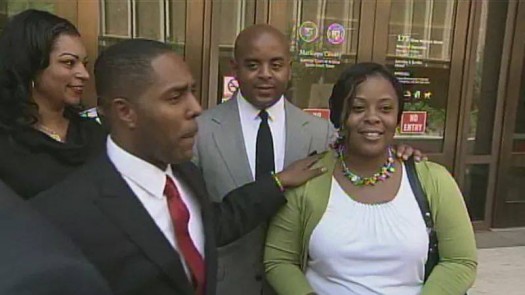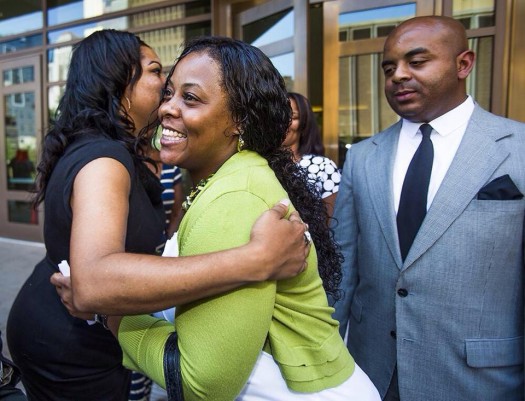Shanesha Taylor & “Better Days To Come”
It was a far cry from the mug shot photograph that first caught my attention. Shanesha Taylor stood smiling flanked by her attorney Benjamin Taylor (no relation) after accepting a deal from prosecutors that will eventually lead to the dismissal of felony charges against her.
I wanted to wait until Shanesha had spoken publicly before writing again. When I wrote about her plight in March, Shanesha was in jail and silenced. I wanted in my own small way to show her as human rather than tragic. So I used the information that I had gathered to write about her plight and to encourage others to take action in support of her.
I wish that the charges were unconditionally dropped but that is not to be. I believe that Shanesha should not have been criminalized in the first place. I rue the robbing of human dignity that permeates our criminal punishment system. Still, Shanesha is relieved and grateful to everyone who has supported her. She’s looking forward to “better days to come” and to being fully reunited with her beloved children.
And so I find myself thinking (again) about black mothers. My thoughts are with the thousands who are spending their nights locked behind bars, separated from their children. As I recall Shanesha’s mugshot, I am reminded of their tears too, invisible to most of us. Cecily McMillan has an op-ed in today’s New York Times that lays bare the torture and brutality that women incarcerated at Rikers Island prison routinely endure. Offering one example, she writes:
Inmates are routinely denied basic medical treatment. I saw a woman soiled with vomit and sobbing for hours. We other inmates were afraid and concerned. We didn’t know what was happening, or what we could do. Finally, at the insistence of a few inmates, she was taken to the hospital. She never came back. Her name was Judith. She had befriended me before she died.
Acknowledging the tears and the pain, I also admire and know of incarcerated women’s resilience, strength and boundless love for their children. In other words, like all of us, they are complex and multi-dimensional people. Within this culture, black mothers are either “bad” or cruelly “self-sacrificing.” As Evelyn C. White (1990) has written: “the images and expectations of black women are actually both super- and sub-human (p.94).” We are caricatured as Sapphires and Jezebels. We are Mammy and Matriarch. We are Superwomen and “Mules of the World.” The missing description always is quite simply: human. It’s that humanity with all its attendant flaws and beauty that I claim for all black women.
I’m happy for Shanesha and I wish only good things ahead. While I celebrate with her, I am conscious of the many, many other unjustly criminalized black women who are languishing in prison, fighting charges, or tragically dead. I am thinking about Debra Harrell, Marissa Alexander, and Nimali Henry (just to name a few).
So for Shanesha and all of us, I dedicate this poem to our humanity as black women.
Sister Outsider
by Opal Palmer Adisa, For Audre Lordewe
women black
are always
outside
even when
we believe
we’re in
but being
out side
ain’t so bad
cause
we be
learning
to love
each other better
we be
learning
to listen
more closely
to one another
we be
learning
to allow
all of us
our humanitysisters
are too often
out side
fronting
trying
to get over
but
we be coming
to gether
coming
together
ending our silence
transforming
space and pace
searching
and finding
the most valuable
is often
that which is
overlooked us


